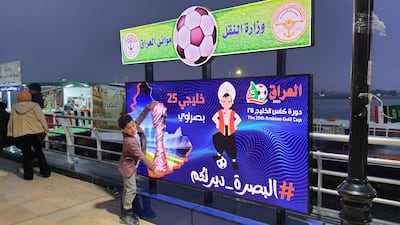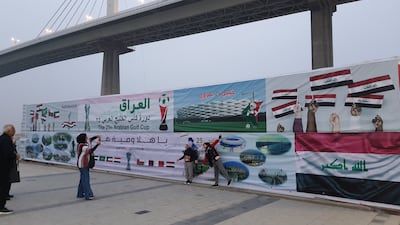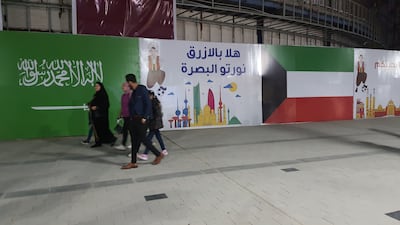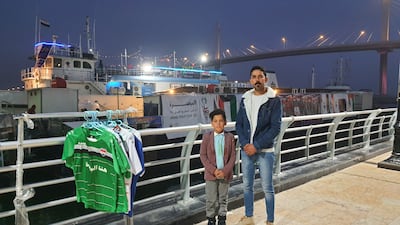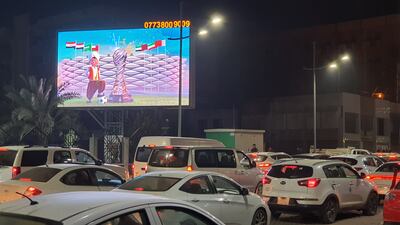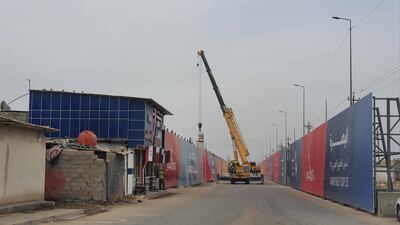These are days that the people of Basra will remember for years to come.
The concerns of daily life in Iraq's southern port city have been overtaken by the excitement of hosting the first Arabian Gulf Cup to be held in the country in more than 40 years.
The 25th edition of the biennial football tournament, which runs from January 6 to January 19, brings together teams from Iraq, the UAE, Saudi Arabia, Kuwait, Bahrain, Oman, Qatar and Yemen — as well as their supporters.
In almost in every corner of Basra there are flags of the Gulf states fluttering in the breeze, billboards welcoming visitors, and posters and statues of the tournament mascot, Sinbad the Sailor.
The streets are infused with a carnival-like atmosphere as local football fans mingle with their peers from Gulf states, all descending on the city’s downtown and filling the streets and cafes with a lively energy.
At night, fans flood the Basra Corniche, chanting and singing their teams’ praises. Iraqis shake hands with visitors, exchanging jokes and posing for selfies.
Vendors sell flags of the participating countries, hats, sports merchandise and souvenirs next to stalls offering a variety of local delicacies and hot drinks, particularly coffee.
Traditional musicians and performers entertain the crowds with music and dance. It is a true celebration of the Gulf region’s rich and diverse culture.
“The atmosphere is really amazing, we are so thrilled to be here,” Yahya Al Hashemi, a fan from Oman, told The National as he and two friends strolled along the Corniche with the Omani flag draped over his shoulders.
For the residents of Basra, the Gulf Cup is more than just a sporting event. It is a chance for the city to show its hospitality and its rich cultural heritage to the rest of the world.
Like many fans from abroad, as well as Iraqi fans from other parts of the country, Mr Al Hashemi and his friends are not staying at a hotel, but have been invited by Basrawis into their homes.
“To be honest, we are surprised with the generosity and decency of the people of Basra,” the 35-year-old businessman and social activist said.
“They didn’t allow us to stay at the hotels; for them it is a shame to have a guest staying at the hotel. You don’t see this in other countries.”
Since his arrival early this week, Mr Al Hashemi has flooded social media, especially on TikTok, with videos showing daily life in Basra, how safe the city is, and encouraging fellow Omanis to visit.
“Omanis were afraid about the situation here, but they are flocking now after seeing our videos that have conveyed the real picture for them,” he said.
“The most beautiful thing about this event is that it has reunited Iraqis with the people of the Gulf states,” taxi driver Haider Abdullah, 29, told The National.
Eight fans from the city of Tikrit, north of Baghdad, are staying on the second floor of his house. Seven Kuwaiti fans are staying next door.
For Iraq, a successful hosting of the tournament is more important than adding another Gulf Cup championship to the three it has won so far, including in 1979 when the country last hosted the tournament.
It will be a strong sign of recovery after decades of war, political isolation and instability, which prompted Fifa to impose a ban on hosting international matches that was lifted only last year.
“All are keen to make this event a success,” Adnan Dirjal, the head of Iraq’s Football Association, told state TV this week.
“I’m positive that this event will remarkably change the general perspective [about sport in Iraq], even within the government itself, to rebuild confidence with the whole world,” he said.
Basra, on the shores of the Arabian Gulf about 530km south of Baghdad, endured major fighting during the 1980-1988 Iran-Iraq war, a bloody uprising against former dictator Saddam Hussein in 1991 and clashes between government forces and local militias in 2008. More recently, the city witnessed violent demonstrations as part the October 2019 anti-government protest movement, as well as protests over a lack of public services.
For some residents, the money allocated for Gulf Cup preparations would have been better spent on important infrastructure, including electricity and water treatment facilities, which are sorely needed in an area that regularly experiences power failures in scorching summer temperatures.
“It’s nice to have such an event in your hometown, but I think it’s not the perfect time,” said Ammar Abid, 22.
“There are other priorities for us now that they should have focused on instead."










